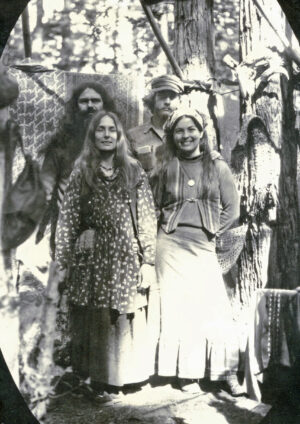
On the August weekend in 1969 that saw nearly half a million children of God on their way to Yasgur’s farm in upstate New York “to try and get their souls free,” what could the Aquarian peace and music lovers stuck in Mendocino do for their souls?
To get myself in the right headspace for this coming Saturday’s Woodstock 50th Anniversary Dance Party, I looked through that summer’s Mendocino Beacon to see what was going on here. The pages of the August 15th edition reveal that locals could attend the 11th annual Art Fair, starting its three-day run of drama, art, music, and discussion on Friday at the Art Center; cheer at the Shoreline Rodeo—featuring Peppermint Twist, “a hulking spotted Brahma crossbred”—kicking off Saturday morning; or they could go for a hike in the Pygmy Forest Reserve, recently designated by Interior Secretary Hickle as a Registered National Landmark. A plaque to that effect was on its way here from Governor Reagan.
If those diversions didn’t appeal, it was once again possible to spend the day on Navarro Beach since the California Court of Appeals had ruled earlier in the week that the road there from Highway 1 could not be closed by people who owned property on its south side. Three years previously, the Kings had hired a bulldozer to cut a trench in the road and fill it with logs to “prevent undesirable people from living on the beach,…leaving debris and trash.” After a lawsuit was filed against the Kings by a Mr. and Mrs. Dietz and others, the state justices ruled unanimously that private property owners cannot block an access road that has historically been open to traffic.
The undesirable people referred to by the Kings may very well have been the same ones Jackie McDonell complained about in a letter to the editor in the April 11th Beacon: “…dirty, depraved hippies who are now cluttering our beaches with their indecent exposure and their illegal and immoral acts.” In fact, “the hairy things” were not limiting their activities to beaches; a whole crowd of them—at least 75—were “living in huts and lean-tos on Road 721 east of Mendocino in Jackson State Forest near the woodlands meadow,” according to forest manager Jean Sindel. That lasted until new rules were adopted by the State Board of Forestry making it illegal to camp outside designated areas in state parks, and the “squatters” were cleared out by law enforcement on April 18th.
Not only were Beacon letter writers irritated and mystified by hippies, campus demonstrators got their goats too. They may have been far away, but they were no less vexing for that. In his bi-weekly column, “Letter from Sacramento,” in the April 4th Beacon, our state senator, Randolph Collier (D-Yreka), deplored the campus unrest in California: “During the past five years our universities have been subjected to acts of violence and disorder by a coalition of dissidents whose sole purpose seems to be to disrupt the orderly procedure of education…by throwing physical and pseudo-intellectual monkey wrenches into our system.”
If the senator was unclear on the purpose of the monkey wrench throwers, he needed only read the front-page story in the same edition about the death of Specialist V Clyde Austin Lucas, of Mendocino, age 21, in Vietnam on March 23rd. “Lucas enlisted in the army after his graduation from Mendocino High in 1966. He was working on road construction in Tuy Hoa when he stepped on a claymore mine. The exploding metal fragments struck his head, causing death. He was due to be discharged from the army in May.”
That article was one of 159 items on Vietnam in 44 of the 52 issues of the Beacon in 1969: young men from the area were drafted or they enlisted; they completed basic training and were assigned to various companies in Vietnam; they were taken prisoner there; they were wounded or killed there; they returned to Letterman Army Hospital in the Presidio; their mothers received their medals posthumously; letter-writers supported the war or were against it; and the Women’s Christian Temperance Union of Fort Bragg raised money for the third year in a row to send Pepsi-Cola to the GIs in Vietnam as a gesture of our support.
To keep body and souls together, Mendocino’s wannabe Woodstockers could patronize local grocery stores and eateries. Homer’s Market was carrying a new type of sweet corn, called Butter and Sugar, which “probably can’t be found in any other California store.” At Mendosa’s steak sale, sirloins were $1.25 per pound. Café Beaujolais, just opened by the Pilsenbergers in February, offered “five-course dinners in the French manner” every Saturday and Sunday night for $5. A short drive was necessary, but patrons at the Pine Beach Inn could eat dinner for $3.50 Friday through Sunday and then dance to live music in the Franciscan Room.
I bet it wasn’t great rock and roll music, not the kind DJ Christina is going to be spinning out this Saturday night at Crown Hall in Mendocino. Tickets are $25 at the door, $20 in advance at Harvest in Fort Bragg and Out of This World or the Kelley House in Mendocino. Proceeds benefit the Kelley House Museum and its programs. Be there or be square!
[Photo 2007-03-442, cropped at the bottom]